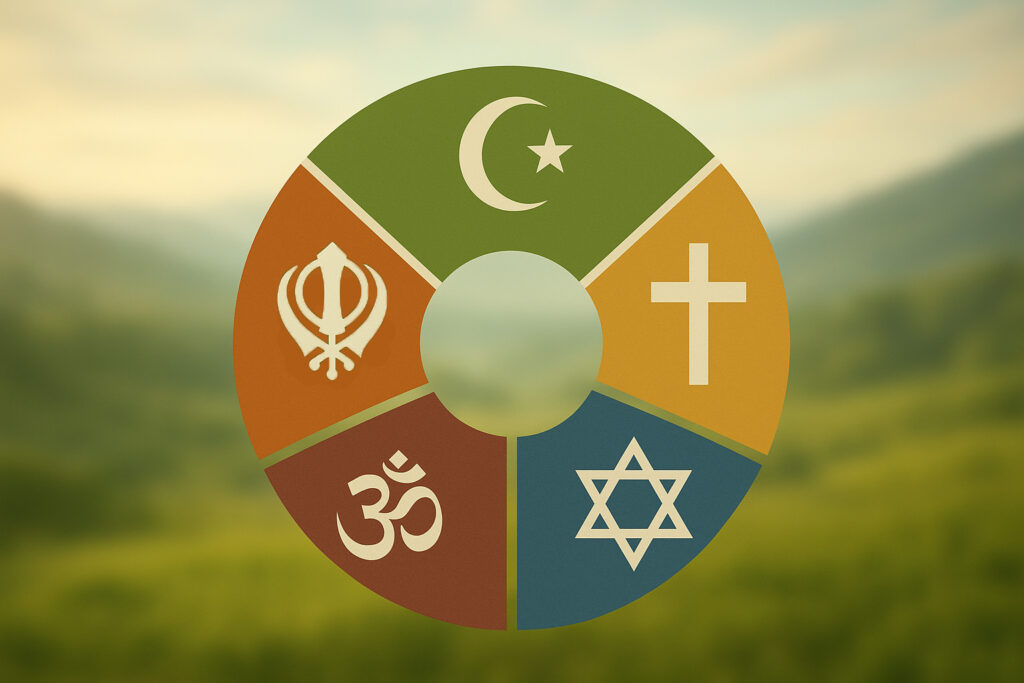IBN ABDUSSALAM, KERALA
In recent weeks, the phrase “I Love Muhammad” has gained widespread visibility across India. The slogan appeared on posters, banners, and social media platforms during events marking Eid-e-Milad-un-Nabi, the celebration of the birth of Prophet Muhammadsa. It was shared by many Muslims as an expression of affection and reverence for the Holy Prophetsa.
Soon after, discussions began across various circles—religious, political, and media—regarding the phrase’s meaning and intent. Some people viewed it as a devotional statement similar to other expressions of spiritual love, while others questioned its timing and public display. In certain areas, differing interpretations led to public debate and incidents of tension.
The phrase has since become part of a broader conversation about religious expression, inter-community sensitivity, and the need for mutual understanding in a pluralistic society like India. Many voices, both within and outside the Muslim community, have called for calm dialogue and for the spirit of the message to be understood in its true, peaceful sense.
While differences can often lead to disputes, Islamic principles provide an excellent framework for the peaceful coexistence of people in a diverse and pluralistic society.
Reformers appeared among every people
According to Islam, Divine guidance is a universal phenomenon that is not confined to any particular region or people. The Quran attests to the fact that God has sent reformers to every nation in the world. It declares:
“Verily, We have sent thee with the truth, as a bearer of glad tidings and as a warner; and there is no people to whom a warner has not been sent.”[1]
It further says:
“And We did raise among every people a Messenger, preaching: ‘Worship Allah and shun the Evil One.’”[2]
According to Islamic teachings, there were 124,000 prophets sent for the guidance of humankind,[3] though only 25 are mentioned by name in the Holy Quran.
In light of these clear declarations, it would be unreasonable to claim that God deprived a great nation like India—or any other region for that matter—from His guidance through prophets or reformers.
Hence, a Muslim’s faith remains incomplete unless they believe in every prophet—from Adamas to Noahas, Abrahamas, Mosesas, Jesusas, Muhammadsa, and all others who appeared among different peoples of the world.
Islam mandates respect for all religious figures
The Holy Quran commands not to differentiate between the prophets of God in terms of their truthfulness:
“We make no distinction between any of His Messengers.”[4]
For a Muslim, therefore, respecting the beliefs and revered figures of other faiths is not merely recommended—it is obligatory and a fundamental part of the Islamic faith.
An incident from the time of Prophet Muhammadsa illustrates this principle. One of his companions once argued with a Jewish man over who was superior—Mosesas or Muhammadsa. Upon hearing this, the Prophetsa advised his companion, saying, “Do not declare my superiority over Moses”.[5] This demonstrated his humility as well as his desire to prevent conflicts.
But more importantly, it reflects a key Islamic teaching: that one should always exercise kindness and decency in matters of faith and never assert their beliefs in a manner that may offend others.
Islam also strictly forbids causing disorder (fitna) or disturbing the peace of society—let alone doing so in the name of religion or the Holy Prophetsa.
Thus, if a person’s love for Muhammadsa leads them to disrespect the revered figures of other faiths, they have misunderstood the true essence of Islam.
The true expression of love
Undoubtedly, for a Muslim, the person of Prophet Muhammadsa is more beloved than anything else in the entire world. However, this love also requires that we never act in a manner that could undermine the honour of the Holy Prophetsa. To express our love at the expense of violating the teachings of the Prophetsa would, in fact, defeat the very purpose of that love.
True love for the Holy Prophetsa is not expressed through slogans or processions, but through emulation of his blessed character—through actions that reflect his values of mercy and kindness. Thus, every Muslim—out of love for the Prophetsa—should strive to be a model of goodness, justice and peace in society. They should embody the Prophetsa’s example of gentleness and respect towards others, and demonstrate through their conduct that Islam truly stands for peace.
It is only through these values that the honour of Islam can be established in people’s hearts. In the words of the Fourth Khalifa of the Ahmadiyya Muslim Community, Hazrat Mirza Tahir Ahmadrh:
“Swords can win territories but not hearts. Force can bend heads but not minds.”[6]
Beauty in diversity
Allah states in the Holy Quran:
“O mankind, We created you from a male and a female, and made you into nations and tribes so that you may recognise one another.”[7]
When God Himself created diversity among His creatures—in race, color, language, and culture—who are we to dispute it? This diversity exists so that we may recognise, respect, and learn from one another, thereby maintaining harmony.
We are fortunate to live in India—a land where this divine diversity thrives—where Hindus, Muslims, Sikhs, Christians, and others share one soil, one air, and one collective identity. To strengthen our nation, we must unite for its progress, extending hands of friendship rather than building walls of suspicion.
Since the purpose of all Prophets and Warners was to connect humankind with God and to fulfil the rights of people by shunning evil, it is the duty of all of us—regardless of faith—to strive for peace and justice in society.
True victory does not lie in proving who loves their prophet more, but in proving how well we embody their teachings of justice, love, and peace.
I pray that Almighty God may unite us and enable us to serve humanity under the slogan:
“Love for All, Hatred for None.”
The author holds a Bachelor of Technology degree in Computer Science and Engineering. He currently serves as the Community’s Outreach Coordinator for the state of Karnataka.
END NOTES
[1] Holy Quran 35:24
[2] Holy Quran 16:36
[3] Sahih Ibn Hibban, Hadith no. 361
[4] Holy Quran 2:285
[5] Sahih al-Bukhari, Kitab al-Khusumat (Book on Quarrels)
[6] Islam’s Response to Contemporary Issues, p. 31
[7] Holy Quran 49:13
Image credit:













0 Comments